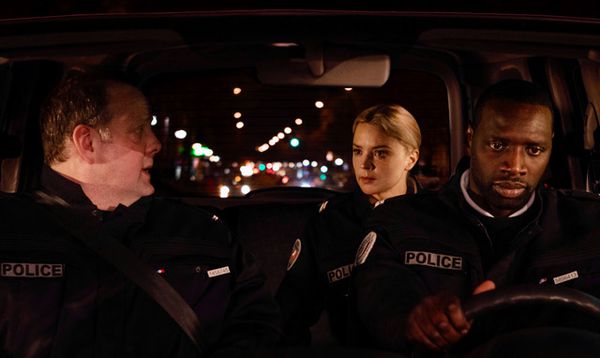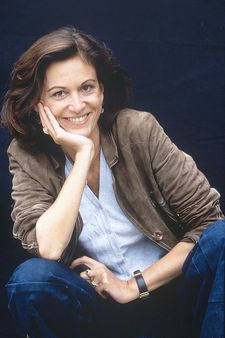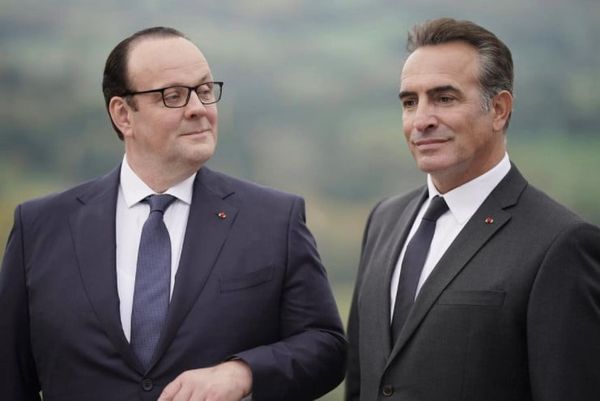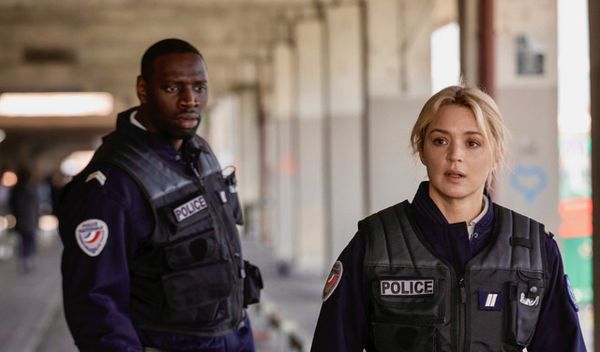 |
| Night Shift stars, from left, Grégory Gadebois, Virginie Efira and Omar Sy. Anne Fontaine: 'It was exciting to create this tension and closeness in intimate proximity' Photo: UniFrance |
The new film kept her sane because it’s an unabashed comedy about what happens when two former Presidents (based on François Hollande and Nicolas Sarkozy) meet up in the wilds of the rural region of Corréze to discuss a strategy for a comeback and regaining the limelight.
 |
| Director Anne Fontaine: 'I dance every day. It gives me a sense of freedom, of space, and that helps me to find new ideas or different angles' Photo: UniFrance |
Gadebois, this time in police uniform, is one of a trio of officers alongside Omar Sy and Virginie Efira in Night Shift (also lensed by Angelo) which examines how they hold their personal and emotional lives together while coping with the daily grind of domestic violence and street crime.
The main attraction for Fontaine, however, was to explore how they coped with the moral dilemmas posed by an unusual mission: to escort a migrant for deportation in the almost certain knowledge that he would be sentenced to death in his home country.
“I was given the book Police to read by the producer Jean-Louis Livi …and by the time I had finished I really wanted to investigate the three main characters and in particular the woman who undertook the mission with her two male colleagues,” said Fontaine.
“The strength of the emotions touched me and I imagined how it could work in cinema. The story had a strong personal arc, but also was universal in the way it dealt with the fate of the immigrant. I liked the fact that they have jobs that don’t oblige them to think, since they have to follow a clearly formulated set of rules. The female character is the one who prompts change and disrupts the routine. Her own fragility and vulnerability lead her to ask questions and reflect on the humanity of their task.”
She adapted the book with her co-writer Claire Barré to focus tightly on the trio. Fontaine explains: “I wanted to put it together in a less linear way. We start with Virginie Efira’s character recounting the story from her point of view and then the standpoints of the other two officers. By the time we find them together in the police car there is familiarity and we know the problems that they each have to confront.
“Virginie is the one who transgresses the rules which are only concerned with taking the person in custody to the airport and nothing else. She has a difficult emotional background and as a result is a lot more sensitive to the situation and what they are about to do. She discovers the man’s life is at stake and she feels a culpability.”
 |
| Grégory Gadebois and Jean Dujardin in Presidents Photo: Jean Dujardin's Instagram |
She relished working with her three principal actors. “Virginie is seen a bit in the mould of ‘the girl next door’ but she is malleable and keen to try different things. The challenge of the role was to express complex emotions through facial expressions rather than in words. She has become one of those French actresses who at the same time is both sexy, bright and also can be very subtle. As for Omar Sy - we think we all know who he is but here is given the chance to be a lot more sensitive and fragile which is why he is such a revelation and rather different from his role in Netflix’s Lupin!. They are interesting couple to watch on screen. I found Grégory Gadebois was quite incredible as the officer who has been brainwashed over the years and prefers to stick by the rules but he also has limits and a certain fragility.”
By the time Fontaine brings them all together for the lengthy sequence in the car the audience feels that they know them inside out. “Obviously it was challenge to shoot in a very reduced environment. At the same time it was exciting to create this tension and closeness in intimate proximity. I chose to shoot in the studio so the car was cut in two which me the possibility of choosing different vantage points. I joked at the beginning that it was a bit like Ingmar Bergman with the cops!”
The almost silent fourth participant is the Tajik asylum seeker Tohirov (Iranian actor Payman Maadi from Asghar Faradi’s A Separation) who sits handcuffed in the back seat while the cops argue.
Fontaine has garnered a reputation for fielding strong and powerful female characters in such films as Nathalie (2003) with, Coco Before Chanel (2009) with Audrey Tautou, and Gemma Bovery (2014) with Gemma Atherton. “I have always been interested in characters that made a difference,” she said. “As I didn’t have any formal training to become a filmmaker I relate more to the characters, because I feel what the characters will be like. I am always intrigued by people who appear to be living what is considered a normal life. When I wander down the streets in any provincial town I wonder why goes on behind the shutters.”
Born in Luxembourg she moved to Paris when she was 16, taking on a variety of jobs including working in a bar, modelling and pursuing a training in dance. Movement remains an important part of her regime. “I dance every day. It gives me a sense of freedom, of space, and that helps me to find new ideas or different angles, and it helps me to develop my characters and write their dialogues. I am always closely connected to the films I make, even if this is hidden within the narrative.”
She was first “discovered” in Cannes Critics’ Week in 1993 with an acerbic comedy about relationships Les histoires d'amour finissent mal... en général, and then was back on the Croisette in 1995 with Augustin, made on a minuscule budget and featuring her actor brother Jean-Chrétien Sibertin-Blanc as an insurance clerk with acting ambitions. She expanded the exploits of the same character in Augustin, Roi du Kung Fu aided and abetted by Maggie Cheung, Darry Cowl and Bernard Campan.
After these two excursions she returned to a postponed script she had been developing Dry Cleaning (Nettoyage à Sec) with Charles Berling as a provincial husband with ambivalent sexuality who falls for the charms of a young man played by Stanislas Mehrar. Fontaine received a Venice Film Festival award for best script. Most recently she tackled such weightier subjects as The Innocents (based on a true story of wartime bravery adapted from the diaries of French Red Cross doctor, Madeleine Pauliac) and the coming-of-age and coming out tale Reinventing Marvin.
With post-production proceeding apace on Presidents she has plenty to occupy her until life returns to some semblance of normality. And she seems sanguine about when the film will meet its public with a logjam of some 140 French titles already in the queue when cinemas are allowed to reopen.
Night Shift screens as part of fff @ home from 13 March at 19.30 for 48 hours. Read more about the programme here and book tickets at www.frenchfilmfestival.org.uk/online






















